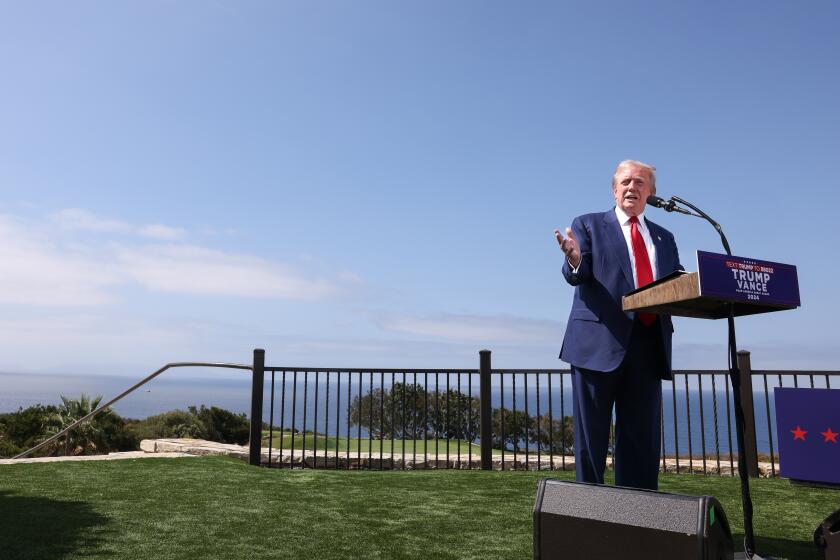Internal memo accuses Sheriff Arpaio’s department of wrongdoing
Top officials in the office of Maricopa County Sheriff Joe Arpaio used its anti-corruption unit to conduct politically motivated investigations, misled the public about a campaign fund that helped Arpaio win reelection and surveilled the Arizona lawman’s campaign rivals, according to an internal memo from a high-ranking officer.
The 63-page memo, first reported Thursday by the Arizona Republic, blames Arpaio’s longtime No. 2 man, Chief Deputy Dave Hendershott, for the alleged criminal wrongdoing.
It comes as a federal grand jury is examining whether Arpaio and allies in the local prosecutor’s office abused their power by investigating and prosecuting political foes. Arpaio’s department is also the subject of a separate federal civil rights investigation into whether it uses racial profiling while enforcing immigration laws.
The memo to Arpaio, written by Deputy Chief Frank Munnell, is a plea for the sheriff to retake control of the department from Hendershott. Munnell, a 30-year department veteran who oversees patrol operations, called for an outside investigation of his allegations.
The department has asked the neighboring Pinal County Sheriff’s Department, run by an Arpaio ally, to look into the accusations.
Arpaio’s office said that, as soon as the memo was brought to the sheriff’s attention, he asked for an investigation. “We’re bending over backward, trying to ensure everyone we’re doing what we’re supposed to do,” department spokesman Lt. Brian Lee said Friday.
Lee said the department could not comment further. In an additional statement, the department urged the public not to “draw any conclusions” until the controversy could be investigated.
Arpaio is a popular and controversial figure in Maricopa County, which includes Phoenix, and nationwide. He has garnered widespread publicity for forcing jail inmates to wear pink underwear and sleep in tents in the desert sun, as well as for ordering his deputies to aggressively enforce immigration laws.
The wide-ranging memo levies various allegations against Hendershott, who is on medical leave following surgery. Two other top officials named in the document have been placed on paid administrative leave during the investigation.
In his Aug. 17 memo, Munnell states that he fears he has “fallen out of favor” with the sheriff and that he has no desire to see Arpaio removed from office. “These allegations are very serious and threaten the very stability and reputation of your great organization,” Munnell wrote. “Although these individuals profess their loyalty to you, it is my belief that you will be outraged by their unethical and reckless behavior.”
The most significant part of the memo concerns a search warrant that Hendershott allegedly directed to be served on the Republican-dominated Maricopa County Board of Supervisors, with whom Arpaio, also a Republican, has been embroiled in a lengthy feud. Arpaio and an ally, former County Atty. Andrew Thomas, filed conflict-of-interest charges against two supervisors that were quickly dismissed by judges as legally unsound.
Those charges, and investigations of the judges and other critics that followed, are believed to be at the heart of the federal grand jury probe.
Munnell wrote that, since the anti-corruption unit was formed in 2007, “it has been the pattern and practice of this unit to conduct politically motivated investigations at the implicit direction of Hendershott.”
Munnell wrote that Hendershott ordered the department’s anti-corruption team to write the search warrant to raid county offices. But team members refused, saying there were no legal grounds for such a search.
Munnell wrote that Hendershott threatened to “machine-gun” his staff to get them to write a warrant. The next day, a top aide to Thomas urged sheriff’s investigators to use “creative writing” to justify the search. The leaders of the squad refused again. Munnell wrote that Hendershott soon replaced several of them.
Munnell also wrote that he, along with other top officials in the agency, donated to the Sheriff’s Command Assn., a fund to help burnish Arpaio’s image. He was startled to later hear the fund described as solely to promote the image of the department, rather than help Arpaio. Munnell called this an attempt to mislead the public. The fund paid for two ads attacking Arpaio’s unsuccessful 2008 challenger, Dan Saban.
The state attorney general launched an inquiry, and Munnell said he spoke with investigators in that case, though he said Hendershott urged him not to. “Sheriff, just as Richard Nixon did not need the help of the Watergate conspirators to win his election, you did not need the ill-advised SCA-funded smear video to win yours,” Munnell wrote in his memo.
Munnell also said that Hendershott asked two other sheriff’s officials to surveil Saban’s meetings in 2008 to see which department employees were supporting him. They refused. In 2000, Munnell writes, Hendershott directed several sheriff’s officials to use a volunteer’s vehicle to watch a meeting held on behalf of Arpaio’s then-challenger to identify department employees who were supporting him.
Arpaio has said that his anti-corruption investigations were legitimate and that ongoing federal investigations into his department are politically motivated. Earlier this month, the Department of Justice sued his office, alleging that Arpaio was refusing to produce basic paperwork in the civil rights probe.
“I find it very unsettling that this office stonewalls all investigations targeting this office, claiming they are political,” Munnell wrote. “However, when this office investigates public officials, we have the audacity to publicly criticize their failure to cooperate with our investigators.”
nicholas.riccardi@latimes.com
More to Read
Get the L.A. Times Politics newsletter
Deeply reported insights into legislation, politics and policy from Sacramento, Washington and beyond. In your inbox three times per week.
You may occasionally receive promotional content from the Los Angeles Times.










